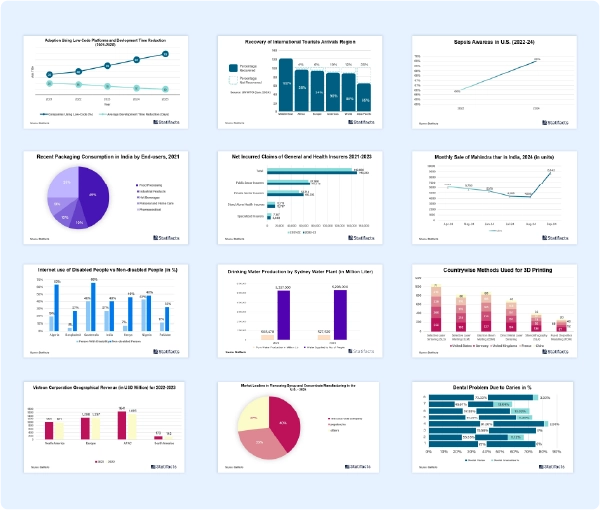The U.S. mRNA therapeutics market size accounted for USD 5,150 million in 2024 and is expected to exceed around USD 12,300 million by 2034, growing at a CAGR of 9.1% from 2025 to 2034.
U.S. mRNA Therapeutics Market Report Highlights
- The infectious disease applications segment dominated the U.S. mRNA therapeutics market in 2024.
- The oncology application segment is expected to grow fastest during the forecast period.
- The prophylactic type segment dominated the market with the highest share in 2024.
- The therapeutics type segment is expected to grow fastest during the forecast period.
- The hospitals & clinics end-use segment dominated the U.S. mRNA therapeutics market with the highest share in 2024.
- The other end-use segment is expected to have significant growth during the forecast period.
The U.S. mRNA therapeutics market refers to the production, distribution, and application of mRNA therapeutics in which mRNA instructs cells in the body to make specific proteins, and proteins play many essential roles in our bodies. mRNA generally uses our own body and biological processes to potentially treat diseases and prevent infections. Especially, mRNA therapy exhibits significant potential as a mutation-agnostic approach that can address virtually any monogenic loss of function disease. Therapeutic mRNA carries the information for a healthy copy of the defective protein, bypassing the problem of targeting specific genetic variants. Additionally, mRNA has broad potential for treating diseases requiring protein expression and higher therapeutic efficacy due to its continuous translation into encoded proteins/peptides to trigger long-lasting expression compared to transient traditional protein/peptide drugs.
The growing use of stem cell therapies worldwide is driving the growth of the U.S. mRNA therapeutics market. Stem cell transplantation has emerged as a promising avenue in regenerative medicine, potentially making easier tissue repair in degenerative diseases and injuries. Stem cell therapy, also called regenerative medicine, promotes the repair response of diseased, injured, or dysfunctional tissue using stem cells or their derivatives. The benefits of stem cell therapy include preventing nerve damage and heart disease, decreasing inflammation, adaptable treatment for many conditions, tissue regeneration, no need for general anesthesia, avoiding the need for surgery, and reducing pain, which helps the growth of the market.
A rise in the number of clinical trials which driving the growth of the U.S. mRNA therapeutics market. The well-designed and well-performed clinical trials provide advantages while allowing others to contribute to knowledge about new treatments or procedures. We gain access to new research treatments before they are widely available. Beyond the obvious and direct public health benefits in terms of both new treatments and new knowledge, clinical research also helps to build research and healthcare capacity and can enhance local infrastructure and boost the economy. The main purpose of clinical trials is to help doctors understand how to treat a particular illness. It may benefit you or others like you in the future. If you take part in a clinical trial, you may be one of the first people to benefit from a new treatment. Clinical trials provide the patient’s unique perspective on the physical, functional, and psychological consequences of treatment and the degree and impact of disease symptoms.
Advancement in research infrastructure contributing to the growth of the U.S. mRNA therapeutics market. Research infrastructures (Ris) are increasingly diverse, which play an important role in allowing and developing research in all scientific domains and represent a large share of research investment. They also play an essential role in supporting research to address critical socio-technical challenges. Additionally, infrastructure can also increase competitiveness, remove productivity constraints, improve the physical mobility of people and products, and reduce the cost of delivered goods. Growing focus on new infrastructure builds and updates achieving sustainability targets like carbon neutrality and energy efficiency.
Artificial intelligence (AI) integration in clinical trials driving the growth of the U.S. mRNA therapeutics market. AI can scan enormous volumes of data in a short time, revealing insights that can provide a more effective means of helping patients identify trials that are right for them. AI can be used to monitor and enhance adherence during the clinical trials. This can be done through tools like smartphone alerts and reminders, tracking of missed clinical visits, and electronic tracking of medications. AI is used in clinical research to improve medication adherence. This is especially through the use of applications like digital biomarkers, and facial and vocal expression to monitor adherence remotely. AI can help clinicians better interpret imaging results. AI technologies can bring about many benefits for society and the economy including addressing complex global challenges, assisting in risky tasks, minimizing errors, fostering innovation, and improving process efficiency.
Published by
Laxmi Narayan

